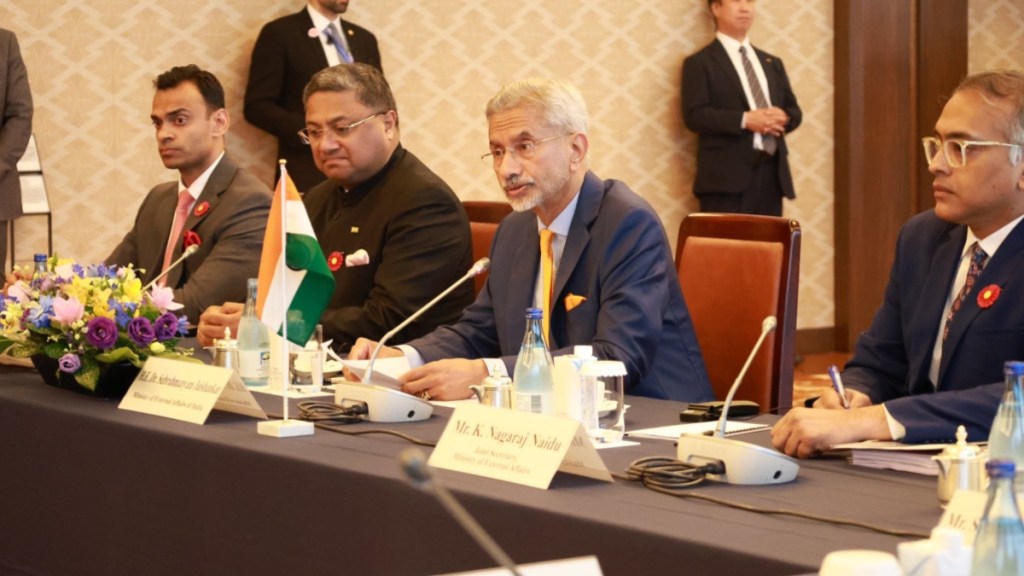On Monday, India firmly dismissed any possibility of third-party mediation in the ongoing border dispute with China. Addressing a press conference in Tokyo, external affairs minister S Jaishankar stated that the issue is bilateral and must be resolved directly between the two nations.
Bilateral Resolution Emphasized
“We are not looking to other countries to sort out what is really an issue between India and China,” Jaishankar stated. His remarks underscored India’s stance on managing its bilateral relations independently, especially in sensitive matters like the border dispute with China. The minister was responding to a series of questions at a press conference in Tokyo on the sidelines of the Quad Foreign Ministers meeting.
He acknowledged the strained relations between India and China. “We have a problem, or, I would say, an issue between India and China…I think it is for two of us to talk it over and to find a way,” he reiterated, stressing the importance of bilateral dialogue.
Global Interest but No Mediation
While Jaishankar recognized that the state of India-China relations holds global significance, he maintained that the resolution must come from within the two countries.
“Other countries in the world would have an interest in the matter, because we are two big countries and the state of our relationship has an impact on the rest of the world. But we are not looking to other countries to sort out what is really an issue between us,” he said, referencing his recent meetings with Chinese Foreign Minister Wang Yi.
Ongoing Efforts to Resolve the Standoff
Jaishankar and Wang Yi have met multiple times this month, including in the Laotian capital during the ASEAN meetings, where they agreed on the need for strong guidance to complete the disengagement process following the military standoff in eastern Ladakh that began in May 2020. Jaishankar emphasized that India’s ties with China cannot normalize without peace in the border areas.
The persistent border row in eastern Ladakh, now in its fifth year, has seen intermittent progress. On July 4, Jaishankar and Wang met again in Astana on the sidelines of the Shanghai Cooperation Organisation (SCO) summit. Despite some disengagement from friction points, a full resolution remains elusive. The fierce clash in the Galwan Valley in June 2020 significantly deteriorated bilateral ties, marking the most serious military conflict between the two nations in decades.
Military Talks and Continued Standoff
To date, India and China have conducted 21 rounds of Corps Commander-level talks to resolve the standoff. India continues to press for the disengagement of the People’s Liberation Army (PLA) from the Depsang and Demchok areas. The latest high-level military talks in February did not yield a breakthrough, but both sides agreed to maintain “peace and tranquillity” on the ground and to continue communication.
Engagements at the Quad Foreign Ministers’ Meeting
In Tokyo, Jaishankar also met with Japanese Prime Minister Fumio Kishida alongside other Quad foreign ministers. He conveyed Prime Minister Narendra Modi’s warm regards and briefed Kishida on the key takeaways from their meeting. Jaishankar expressed appreciation for Kishida’s guidance in fostering the growth of the Quad grouping and enhancing India-Japan relations.
Jaishankar highlighted the expansive agenda of the Quad, noting the group’s progress in areas such as trusted telecom technology, undersea cable connectivity, humanitarian and disaster relief (HADR), critical and emerging technologies, cyber and health security, climate action, infrastructure, capacity building, STEM education, maritime domain awareness, and counter-terrorism. He stressed that the Quad is a platform for practical outcomes, not just discussions.
Quad’s Practical Outcomes and Future Plans
“Our HADR conversations are reflected in understanding and SOPs between our Navies. The Indo-Pacific Maritime Domain Awareness initiative that came out of Quad today links information fusion centres. The Open-RAN network, which we have spoken about so much, is being deployed in Palau. A space-based climate warning system will be launched soon in Mauritius. Off-grid solar projects are happening in the Indo-Pacific islands. During Covid, we cooperated to deliver vaccines to countries in this region. And the first cohort of Quad STEM fellowships is passing out and the second one will also cover ASEAN,” Jaishankar explained.
He concluded by emphasizing the Quad’s role in promoting a free and open Indo-Pacific, a rules-based order, and global good, underscoring the stabilizing influence of the Quad in an uncertain world.

